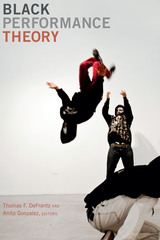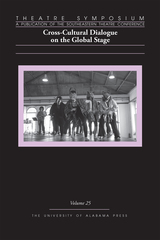3 books by Gonzalez, Anita

Black Performance Theory
Thomas F. DeFrantz and Anita Gonzalez, eds.
Duke University Press, 2014
Black performance theory is a rich interdisciplinary area of study and critical method. This collection of new essays by some of its pioneering thinkers—many of whom are performers—demonstrates the breadth, depth, innovation, and critical value of black performance theory. Considering how blackness is imagined in and through performance, the contributors address topics including flight as a persistent theme in African American aesthetics, the circulation of minstrel tropes in Liverpool and in Afro-Mexican settlements in Oaxaca, and the reach of hip-hop politics as people around the world embrace the music and dance. They examine the work of contemporary choreographers Ronald K. Brown and Reggie Wilson, the ways that African American playwrights translated the theatricality of lynching to the stage, the ecstatic music of Little Richard, and Michael Jackson's performance in the documentary This Is It. The collection includes several essays that exemplify the performative capacity of writing, as well as discussion of a project that re-creates seminal hip-hop album covers through tableaux vivants. Whether deliberating on the tragic mulatta, the trickster figure Anansi, or the sonic futurism of Nina Simone and Adrienne Kennedy, the essays in this collection signal the vast untapped critical and creative resources of black performance theory.
Contributors. Melissa Blanco Borelli, Daphne A. Brooks, Soyica Diggs Colbert, Thomas F. DeFrantz, Nadine George-Graves, Anita Gonzalez, Rickerby Hinds, Jason King, D. Soyini Madison, Koritha Mitchell, Tavia Nyong'o, Carl Paris, Anna B. Scott, Wendy S. Walters, Hershini Bhana Young
Contributors. Melissa Blanco Borelli, Daphne A. Brooks, Soyica Diggs Colbert, Thomas F. DeFrantz, Nadine George-Graves, Anita Gonzalez, Rickerby Hinds, Jason King, D. Soyini Madison, Koritha Mitchell, Tavia Nyong'o, Carl Paris, Anna B. Scott, Wendy S. Walters, Hershini Bhana Young
[more]

Shipping Out
Race, Performance, and Labor at Sea
Anita Gonzalez
University of Michigan Press, 2025
Shipping Out: Race, Performance, and Labor at Sea provides a rare perspective on performance by staff above and below deck on Caribbean cruise ships, as viewed through the lenses of race, class, and gender. Drawing on her experiences as a destination lecturer on Caribbean cruise lines for twenty years, Anita Gonzalez offers a unique viewpoint as she examines contemporary Caribbean cruise culture as an ethnographically complex site where North American and European travelers are exposed to other cultures through the orchestrated experiences on ship, and via excursions to ports. Gonzales argues that the cruise ship experience is deliberately crafted to deliver the best immersive performance by its workers. However, the workers never leave the theater, they merely move below deck—and like ships’ stewards and cooks from previous centuries, they work within an imaginary where Global Majority people are envisioned as servants. By utilizing ethnography and archival materials to illustrate the ship worker’s experiences on contemporary cruise ships, and then contrasting those circumstances with the personal accounts of workers on historical merchant ships, Shipping Out illuminates how workers’ presence on ships complicates notions of freedom and enslavement, home and journey, place and space.
[more]

Theatre Symposium, Vol. 25
Cross-Cultural Dialogue on the Global Stage
Edited by Becky K. Becker
University of Alabama Press, 2017
Addresses the ways that theatre both shapes cross-cultural dialogue and is itself, in turn, shaped by those forces.
Globalization may strike many as a phenomenon of our own historical moment, but it is truly as old as civilization: we need only look to the ancient Silk Road linking the Far East to the Mediterranean in order to find some of the earliest recorded impacts of people and goods crossing borders. Yet, in the current cultural moment, tensions are high due to increased migration, economic unpredictability, complicated acts of local and global terror, and heightened political divisions all over the world.
Thus globalization seems new and a threat to our ways of life, to our nations, and to our cultures. In what ways have theatre practitioners, educators, and scholars worked to support cross-cultural dialogue historically? And in what ways might theatre embrace the complexities and contradictions inherent in any meaningful exchange? The essays in Theatre Symposium, Volume 25 reflect on these questions.
Featured in Theatre Symposium, Volume 25
Globalization may strike many as a phenomenon of our own historical moment, but it is truly as old as civilization: we need only look to the ancient Silk Road linking the Far East to the Mediterranean in order to find some of the earliest recorded impacts of people and goods crossing borders. Yet, in the current cultural moment, tensions are high due to increased migration, economic unpredictability, complicated acts of local and global terror, and heightened political divisions all over the world.
Thus globalization seems new and a threat to our ways of life, to our nations, and to our cultures. In what ways have theatre practitioners, educators, and scholars worked to support cross-cultural dialogue historically? And in what ways might theatre embrace the complexities and contradictions inherent in any meaningful exchange? The essays in Theatre Symposium, Volume 25 reflect on these questions.
Featured in Theatre Symposium, Volume 25
- “Theatre as Cultural Exchange: Stages and Studios of Learning” by Anita Gonzalez
- “Certain Kinds of Dances Used among Them: An Initial Inquiry into Colonial Spanish Encounters with the Areytos of the Taíno in Puerto Rico” by E. Bert Wallace
- “Gertrude Hoffmann’s Lawful Piracy: ‘A Vision of Salome’ and the Russian Season as Transatlantic Production Impersonations” by Sunny Stalter-Pace
- “Greasing the Global: Princess Lotus Blossom and the Fabrication of the ‘Orient’ to Pitch Products in the American Medicine Show” by Chase Bringardner
- “Dismembering Tennessee Williams: The Global Context of Lee Breuer’s A Streetcar Named Desire” by Daniel Ciba
- “Transformative Cross-Cultural Dialogue in Prague: Americans Creating Czech History Plays” by Karen Berman
- “Finding Common Ground: Lessac Training across Cultures” by Erica Tobolski and Deborah A. Kinghorn
[more]
READERS
Browse our collection.
PUBLISHERS
See BiblioVault's publisher services.
STUDENT SERVICES
Files for college accessibility offices.
UChicago Accessibility Resources
home | accessibility | search | about | contact us
BiblioVault ® 2001 - 2024
The University of Chicago Press









